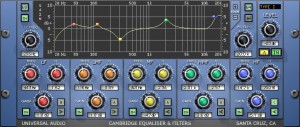
Haven’t written for a while, because I’ve been super busy in the studio with several big mixing projects, as well as some remixing/reworking type projects.
However, I just wanted to add a quick article to my “Must Have” series to point out the UAD Cambridge EQ, which I use on somewhere around 80% of the tracks in a mixing project. It’s not a plugin that will blow you away with its vibe or sound. What it is, simply, is a very flexible EQ that does its job cleanly and easily while hardly using up any of your UAD card’s processing power.
If you’ve read some of my other articles on this site, you may note that I’m a huge fan of using high-pass filters on almost every track, to get rid of low end rumble and other subsonic noise that just eats up energy and takes up valuable low end space. Most tracks, other than the bass and kick drum, get aggressively filtered to remove most of the frequencies below somewhere around 80 to 100 hz. In most modern pop/rock & electronic based music, you want to reserve those lowest frequencies for your bass and kick drum. Those frequencies simply aren’t needed in most other instruments, especially in a very busy mix.
Even with the bass and kick drum, I’ll often still use the Cambridge, set to the Elliptic filter, which has a nice little resonant peak at the cutoff frequency. I use that to slightly boost the lowest frequency I want for my bass, or the deep thud of the kick drum, while simultaneously getting rid of all the subsonic frequencies that I don’t want.
The best thing about the Cambridge is all the filter choices you have for both high-pass and low-pass filters. It’s worth the price just for all those choices! But, you also get 5 other bands of fully parametric EQ to play around with, including three different “types” to choose from, which affects the shape of those 5 parametric EQ bands. Most of the time I’m using the Cambridge just for the high-pass filters, but it’s also a great EQ to use to zero in on problem frequencies and do some subtractive EQ to fix those. It doesn’t really have a sound or character, so if I want to do some aggressive EQ boosting on a track, I’ll usually pick another EQ that has more character to it. Often, though, when you don’t want anything other than a neutral utility EQ, the Cambridge is more than enough to fit your needs.
This is definitely one of those plugins that I can’t live without. New plugins are constantly being released, and I’ll often try them out and use them for a few projects, but then many of those stopped getting used after a while. The Cambridge EQ, however, is one that gets used in almost every mixing project I do!